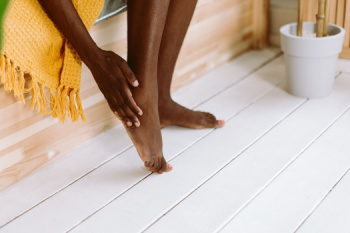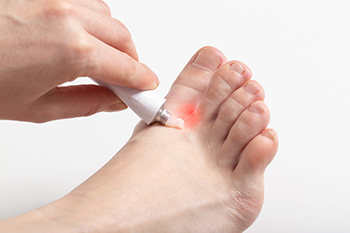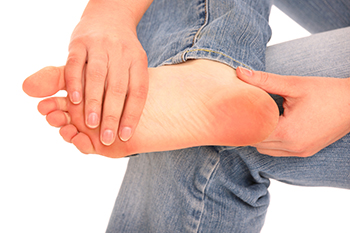
Heel pain is a common issue that can be caused by numerous conditions like plantar fasciitis, Achilles tendonitis, or bursitis. Arthritis and gout can also play a role. Plantar fasciitis causes sharp pain in the bottom of the heel, especially with the first steps in the morning. Achilles tendonitis results in pain and swelling in the back of the heel due to overuse or strain on the Achilles tendon. Bursitis involves inflammation of the fluid-filled sacs around the heel, causing pain and swelling. Arthritis and gout can lead to joint pain, swelling, and redness, often in the heel area. The causes of heel pain vary but often involve repetitive stress, poor footwear, obesity, or underlying health conditions like arthritis or gout. The pain can range from mild to severe and can significantly impact mobility. A podiatrist can diagnose the underlying cause of heel pain and recommend treatment, such as targeted exercises, orthotics, medication, or, in severe cases, surgery. If you are dealing with heel pain, it is suggested that you make an appointment with a podiatrist.
Many people suffer from bouts of heel pain. For more information, contact Philip C. Caswell, DPM of Family Foot & Ankle Care. Our doctor can provide the care you need to keep you pain-free and on your feet.
Causes of Heel Pain
Heel pain is often associated with plantar fasciitis. The plantar fascia is a band of tissues that extends along the bottom of the foot. A rip or tear in this ligament can cause inflammation of the tissue.
Achilles tendonitis is another cause of heel pain. Inflammation of the Achilles tendon will cause pain from fractures and muscle tearing. Lack of flexibility is also another symptom.
Heel spurs are another cause of pain. When the tissues of the plantar fascia undergo a great deal of stress, it can lead to ligament separation from the heel bone, causing heel spurs.
Why Might Heel Pain Occur?
- Wearing ill-fitting shoes
- Wearing non-supportive shoes
- Weight change
- Excessive running
Treatments
Heel pain should be treated as soon as possible for immediate results. Keeping your feet in a stress-free environment will help. If you suffer from Achilles tendonitis or plantar fasciitis, applying ice will reduce the swelling. Stretching before an exercise like running will help the muscles. Using all these tips will help make heel pain a condition of the past.
If you have any questions please contact our office located in Sparta, NJ . We offer the newest diagnostic and treatment technologies for all your foot and ankle needs.

Athlete’s foot bumps are small, itchy, and sometimes painful raised areas on the skin caused by a fungal infection known as tinea pedis. This condition thrives in warm and moist environments, making feet a common target. People who frequently wear tight or non-breathable shoes are at higher risk, as sweat and heat create the perfect setting for fungal growth. Walking barefoot in public places, such as locker rooms, areas around swimming pools, and communal showers, increases exposure to the fungus. Individuals with weakened immune systems or underlying conditions like diabetes may be more susceptible. Sharing footwear or towels with an infected person can also spread the infection. If you notice bumps on your feet that are itchy, it is suggested that you visit a podiatrist who can accurately diagnose and treat athlete’s foot.
Athlete’s foot is an inconvenient condition that can be easily reduced with the proper treatment. If you have any concerns about your feet and ankles, contact Philip C. Caswell, DPM from Family Foot & Ankle Care. Our doctor will treat your foot and ankle needs.
Athlete’s Foot: The Sole Story
Athlete's foot, also known as tinea pedis, can be an extremely contagious foot infection. It is commonly contracted in public changing areas and bathrooms, dormitory style living quarters, around locker rooms and public swimming pools, or anywhere your feet often come into contact with other people.
Solutions to Combat Athlete’s Foot
- Hydrate your feet by using lotion
- Exfoliate
- Buff off nails
- Use of anti-fungal products
- Examine your feet and visit your doctor if any suspicious blisters or cuts develop
Athlete’s foot can cause many irritating symptoms such as dry and flaking skin, itching, and redness. Some more severe symptoms can include bleeding and cracked skin, intense itching and burning, and even pain when walking. In the worst cases, Athlete’s foot can cause blistering as well. Speak to your podiatrist for a better understanding of the different causes of Athlete’s foot, as well as help in determining which treatment options are best for you.
If you have any questions please feel free to contact our office located in Sparta, NJ . We offer the newest diagnostic and treatment technologies for all your foot and ankle needs.

Mechanical foot pain is one of the most common reasons people visit a podiatrist. It happens when the structures in your feet, like bones, muscles, ligaments, or tendons, are strained or overworked. This type of pain often results from too much standing, walking, running, or wearing unsupportive shoes. Flat feet, high arches, and poor foot alignment can also lead to mechanical pain. You might feel aching, soreness, or sharp pain, usually in the heel, arch, or ball of the foot. The good news is that mechanical foot pain often improves with rest, wearing proper footwear, custom orthotics, stretching, and strengthening exercises. If foot pain is making it hard to get through your day, it is suggested that you visit a podiatrist who can diagnose the problem and help you find relief.
Foot Pain
Foot pain can be extremely painful and debilitating. If you have a foot pain, consult with Philip C. Caswell, DPM from Family Foot & Ankle Care. Our doctor will assess your condition and provide you with quality foot and ankle treatment.
Causes
Foot pain is a very broad condition that could be caused by one or more ailments. The most common include:
- Bunions
- Hammertoes
- Plantar Fasciitis
- Bone Spurs
- Corns
- Tarsal Tunnel Syndrome
- Ingrown Toenails
- Arthritis (such as Gout, Rheumatoid, and Osteoarthritis)
- Flat Feet
- Injury (from stress fractures, broken toe, foot, ankle, Achilles tendon ruptures, and sprains)
- And more
Diagnosis
To figure out the cause of foot pain, podiatrists utilize several different methods. This can range from simple visual inspections and sensation tests to X-rays and MRI scans. Prior medical history, family medical history, and any recent physical traumatic events will all be taken into consideration for a proper diagnosis.
Treatment
Treatment depends upon the cause of the foot pain. Whether it is resting, staying off the foot, or having surgery; podiatrists have a number of treatment options available for foot pain.
If you have any questions, please feel free to contact our office located in Sparta, NJ . We offer the newest diagnostic and treatment technologies for all your foot care needs.

